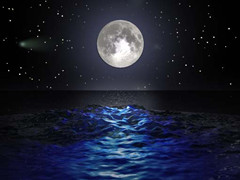英语听力文摘 English Digest 474、海洋独特的磁场
时间:2019-01-26 作者:英语课 分类:英语听力文摘 English Digest
Motional Induction
Last time, we talked about “motional induction,” a phenomenon by which the ocean generates a magnetic field.
It works like this: earth has its own magnetic field. The ocean has plenty of charged atoms in it, in the form of dissolved salt. These atoms are in motion because the ocean flows.
Charged atoms moving through a magnetic field will induce an electric current. And an electric current will, in turn, create another magnetic field. The ocean should generate its own magnetic field.
You said should. How could we know this “motional induction” is happening?
Direct evidence came in 2003 from scientists working at the University of Washington and a research institute in Potsdam, Germany. These researchers used a magnetometer on board an orbiting satellite.
First, they figured out what the magnetic field of the planet should be. After subtracting this figure, they found there was still some leftover magnetic field.
Next, the team made a computer model of what kind of magnetic field the ocean should generate through motional induction. Sure enough, their prediction matched the excess magnetic field measured by the satellite.
The satellite also found that magneticintensity over the oceans peaked every twelve and a half hours, but not over the land. Can you guess why?
Every twelve hours… Oh, I get it— tides!
Exactly right! The tides rise and fall every twelve and half hours, just as that extra magnetic energy swells and diminishes. This is very strong evidence that motional induction is real… and the ocean has its own magnetism 1.

上次,我们提到过动生电磁感应:海洋产生磁场的一种现象。
地球有自己的磁场,海洋有无数溶解盐形式的带电原子,随着海洋运动而运动。
在磁场中运动的带电原子会引起电流,而电流反过来又回形成另一个磁场。这样海洋应该就形成了自己的磁场。
你说“应该”,我们怎么知道这种动生电磁感应确有其事?
直到2003年,华盛顿大学和德国波兹坦的某研究学院研究人员将磁力计放在轨道卫星上,证实海洋的磁场真是存在。
最初,磁力计上的数据让科学家以为是地球磁场作用的。
而后,他们发现除去这个因素后,仍然有磁场存在。
研究人员又电脑模拟在动生电磁感应让海洋产生哪种磁场,当然,科学家的推论和卫星上测出的“另一个”磁场吻合。
卫星还发现,海洋磁场每隔12个半小时就会出现高峰,但是地球磁场不受影响。你能猜到原因吗?
每隔12个半小时?我知道了!答案是潮汐。
完全正确!潮汐每隔12个半小时潮起潮落,正好和“另一个”磁场高低峰吻合。这正是磁场感应存在的真凭实据,海洋确实有自己独特的磁力。